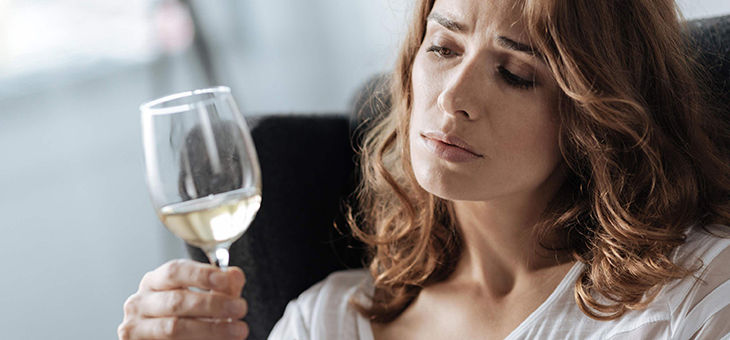Over the past year and a half, many of us turned to alcohol to get us through the various lockdowns and other challenges the pandemic presented. In fact, data from Roy Morgan’s Alcohol Consumption Report shows that the proportion of Australians who drink alcohol increased by 0.8 per cent to 67 per cent in 2020. This is the first year-over-year increase since 2016.
In 2020, a total of 13,337,000 Australians (67 per cent) aged 18 and over consumed alcohol in an average four-week period, up from 13,021,000 (66.2 per cent) a year earlier.
Cast your mind back to the headlines about ‘drinkers rushing to bottle stores before lockdown’ and it’s probably easy to see why.
One local bottle shop owner in Sydney said he had done three weeks’ worth of trading in two hours on the Sunday before our first lockdown.
Read: Older Australians more likely to abuse alcohol, study finds
It’s easy to reach for another glass when you’re stuck at home without much else to do but it might not be the best thing.
The Australian Department of Health advises that healthy men and women should drink no more than 10 standard drinks a week and no more than four standard drinks on any one day.
The less you choose to drink, the lower your risk of harm from alcohol. For some people, not drinking at all is the safest option.
As well as sticking inside the national guidelines for alcohol consumption, here’s how creating the habit of having at least one or two alcohol-free days every week will help you stay healthy.
Lessen carcinogenic effects
Regular alcohol consumption, even at low to moderate levels, has been linked to an increase in a range of cancers, including mouth, pharynx, larynx, oesophagus, bowel in men and breast in women, and liver cancer.
Former director of Australia’s National Drug Research Institute Professor Tim Stockwell, who is now based at the University of Victoria in Canada, says you can reduce these risks by cutting back.
Alcohol is broken down into acetaldehyde when we first digest it.
“Acetaldehyde attacks the tissues it comes into contact with which have to repair themselves each time, thus increasing the risk of tumours developing,” says Prof. Stockwell.
You might feel less anxious
Regular drinking alters the chemicals of the brain. You may notice a decrease in feelings of anxiety while you’re drinking but it often doesn’t last.
“People who drink for stress relief can actually fuel their underlying anxiety level,” Prof. Stockwell says.
“A depressant drug like alcohol causes our nervous system to compensate for its direct effects. This is why symptoms such as sweating, racing heart, shaking hands and increased anxiety occur when we’re withdrawing from alcohol.
“We can all feel a mild version of that the day after having several alcoholic drinks,” he says.
It can help to break the habit
Taking one or two days away from alcohol each week is a way to stop a habit forming.
If you regularly reach for a bottle when you get home from work or when it hits a certain point in the evening, it’s easy to associate alcohol with relaxation. It can get to the point where your body knows your desire without you really having to think about it.
Days off booze can break this rhythm by forcing you to stop and think, ‘I can’t do that, today’s an alcohol-free day’.
Read: Could I be classed an alcoholic?
It can make you more aware of how much you consume
If you find yourself struggling with one or two alcohol-free days each week, you may be using alcohol as a coping mechanism.
Stopping yourself before reaching for a drink can make you realise how frequently you’re doing it. If you’re often using alcohol as stress relief, it may be time to reach out for help or explore other techniques.
It can save you some cash
Whatever your drink of choice is, it’s likely more expensive than a glass of water or a cup of tea.
You might be encouraged to do something else with your spare time
Instead of heading to the sofa with a glass of red in hand, you could be starting your next project, learning a new skill or even planting and growing herbs (for your next well-deserved cocktail garnish, perhaps).
It gives you time to try some non-alcohol drinks
In 2020, Australia’s first non-alcoholic bar opened, and major liquor retailers are dedicating more and more shelf space for the growing range of no-alcohol and low-alcohol drinks.
Alcohol-free wines, beers and spirits are becoming increasingly sophisticated and delicious.
You’ll likely feel and look better
Alcohol can interfere with your sleep patterns, making you feel tired and flat. It’s also a diuretic, so if you don’t drink enough water, it’ll dehydrate you, accelerating the ageing process.
Read: Five ways to make non-alcoholic drinks more interesting
You might shed a few kilos
Alcohol is packed with sugar – on average, a 125ml glass of wine contains 114 calories – and when you’ve had a few drinks, you’re less likely to make healthy food choices.
But remember alcohol-free days do not mean you can ‘save up’ those drinks and have more than recommenced on other days.
How often do you drink? Have you tried any alcohol-free beer, wine or spirits? Why not share your favourite non-alcoholic drink in the comments section below?
– With PA
Health disclaimer: This article contains general information about health issues and is not advice. For health advice, consult your medical practitioner.
If you enjoy our content, don’t keep it to yourself. Share our free eNews with your friends and encourage them to sign up.

